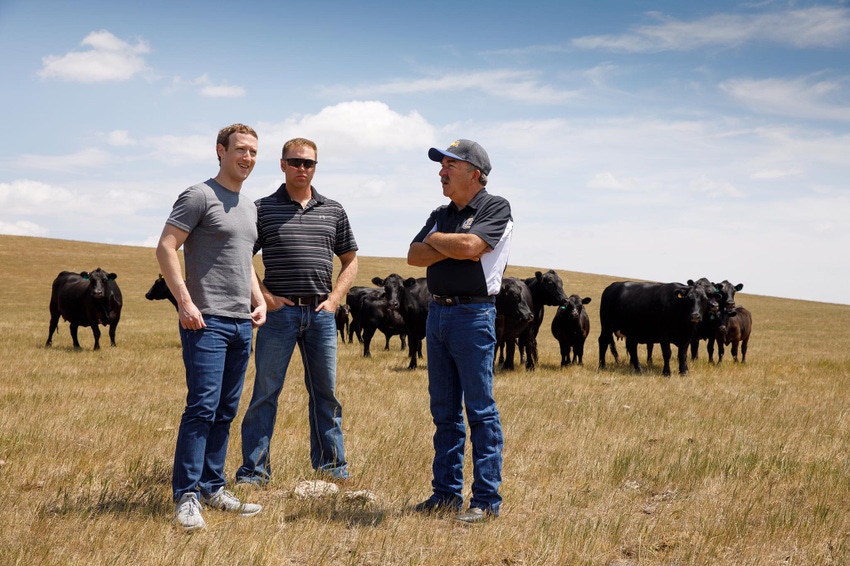The response to Mark Zuckerberg’s visit to a cattle ranch was mixed. Did his personal testimony on Facebook benefit the beef industry?
July 17, 2017

Facebook founder Mark Zuckerberg has been on a quest in 2017 to travel across the country visiting the people and places that make America great. It’s been great to follow his journey across the U.S., particularly since he’s making a point to stop in rural communities to learn more about where his food, fiber and fuel comes from.
Most recently, Zuckerberg stopped in my home state where he toured a 2,500 acre cattle ranch near Piedmont, owned by the Norman family. The South Dakotans gracefully hosted one of the most popular men on the planet and explained to him how cattle are raised and beef is produced.
Here is what he had to say about his stop in South Dakota:
“Several years ago at Facebook, our chefs cooked a whole pig. I remember someone saying it would be delicious but she wished she didn't have to see where the meat came from. I've always thought we should be thankful and understand where our food comes from -- so for that year I set a goal to only eat meat that I killed and helped butcher myself.
“A lot of our cattle starts in South Dakota where there are about three times as many cows as people. The Normans raise calves until they're about 600 pounds and then send them to feed lots to get fattened and harvested. A lot of cattle are fertilized through artificial insemination. As we were talking, it became clear ‘AI’ means something very different out here!
“South Dakota is in its third year of a bad drought, and that makes it tough to feed the cattle. One of the ranchers told me it's the worst drought he can remember -- and maybe the worst since the 1930s. The family will probably need to shrink their herd of 500 cattle by 10-15% since that's all the land can support.
“The Normans talked about other challenges -- from regulations limiting the hours trucks can be on the road at a time (increasing the risk that cattle will die in the back), to high-frequency trading that makes cattle prices more volatile and harder to set, to the lack of harvesting plants nearby that means some cattle has to be sent as far as China to be slaughtered.
READ: Of Facebook and critical thinking
“But overall, they seemed optimistic that technology was making their work easier. They talked about how their machinery was now more stable, how the balers that make bales of hay now measure the moisture of the hay to make sure it's ideal, and how they might use drones to monitor the herd in the near future.
“The Normans are proud of the work they do -- not just feeding the country, but helping provide things like insulin, leather and makeup ingredients that also come from cattle. Thanks to the Normans for welcoming me into their home. Families like theirs don't always get a lot of credit, but we depend on the work they do.”
What a beautiful testimony from an outsider looking in and trying to learn more about the beef cattle business! Not surprisingly, there were many anti-agriculture sentiments shared in the comments section on Zuckerberg’s page. Although I imagine by now, he has pretty thick skin!
READ: Mark Zuckerberg cowboys up in Texas
The best part about this stop on his journey is so many cattlemen took the time to thank Zuckerberg for visiting cattle country. These folks also answered some questions or address some misconceptions that were being discussed in the comments section.
Sometimes it feels like victories in impacting consumer perceptions about the industry are few and far between, but this was, without a doubt, a slam dunk for the beef industry! Let’s continue to nurture this positive momentum by keeping the conversation rolling on social media. Take a minute to share a photo from your ranch, offer grilling tips or recipe ideas to friends, or correct misinformation by sharing educational resources for consumers to explore.
Whether we like it or not, our urban consumer is our teammate in this business. Their vote and their dollar ultimately decides how we get to run our operations. It benefits us to have them on our side and for them to be excited about what we do in rural America.
The opinions of Amanda Radke are not necessarily those of beefmagazine.com or Penton Agriculture.
About the Author(s)
You May Also Like





